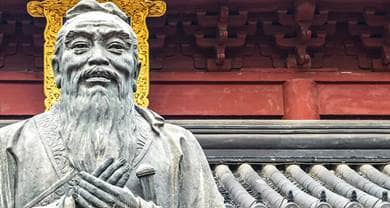- Trending:
- Pope Leo Xiv
- |
- Israel
- |
- Trump
- |
- Social Justice
- |
- Peace
- |
- Love

RELIGION LIBRARY
Confucianism
Principles of Moral Thought and Action
Kongzi provided few specific moral principles. One should obey one's elders and superiors and treat rulers, parents, and even those who were not one's social equals with respect. One should also respect ritual, cultivate wisdom, be trustworthy, and strive to do the right thing in any situation.
 According to Kongzi's disciple Zengzi, Kongzi's Tao (Way) consisted of "nothing but other-regard and self-reflection"(Lunyu 4:15). The conventional meaning of "other-regard" (zhong) in classical Chinese is "loyalty," especially loyalty to a ruler on the part of a minister. In the Lunyu, Kongzi extends the meaning of the term to include exercising oneself to the fullest in all relationships, including relationships with those below oneself as well as with one's betters.
According to Kongzi's disciple Zengzi, Kongzi's Tao (Way) consisted of "nothing but other-regard and self-reflection"(Lunyu 4:15). The conventional meaning of "other-regard" (zhong) in classical Chinese is "loyalty," especially loyalty to a ruler on the part of a minister. In the Lunyu, Kongzi extends the meaning of the term to include exercising oneself to the fullest in all relationships, including relationships with those below oneself as well as with one's betters.
"Self-reflection" (shu) is explained by Kongzi as a negatively-phrased version of the "Golden Rule": "What you do not desire for yourself, do not do to others" (Lunyu 15.24). When one reflects upon oneself, one realizes the necessity of concern for others. The self as conceptualized by Kongzi is a deeply relational self that responds to inner reflection with outer virtue.
 Similarly, the self that Kongzi wishes to cultivate in his own person and in his disciples is one that looks within and compares itself with the aesthetic, moral, and social canons of tradition. Aware of its source in Tian, it seeks to maximize ren (co-humanity -- i.e., how humans ought to treat other humans) through apprenticeship to li (ritual) so as to exercise de (moral charisma) in a manner befitting a junzi (profound person -- i.e., the Confucian ideal). The apparent tension between the experiences and impulses of one's physical self (the body) and one's mental or spiritual self (the mind, or the soul) that is so familiar in Western as well as Indian thought is absent in Confucianism. For Kongzi, there is no dichotomy between inner and outer, self and whole, and thus the cumulative effect of Confucian self-cultivation is not merely personal, but collectively social and even cosmic.
Similarly, the self that Kongzi wishes to cultivate in his own person and in his disciples is one that looks within and compares itself with the aesthetic, moral, and social canons of tradition. Aware of its source in Tian, it seeks to maximize ren (co-humanity -- i.e., how humans ought to treat other humans) through apprenticeship to li (ritual) so as to exercise de (moral charisma) in a manner befitting a junzi (profound person -- i.e., the Confucian ideal). The apparent tension between the experiences and impulses of one's physical self (the body) and one's mental or spiritual self (the mind, or the soul) that is so familiar in Western as well as Indian thought is absent in Confucianism. For Kongzi, there is no dichotomy between inner and outer, self and whole, and thus the cumulative effect of Confucian self-cultivation is not merely personal, but collectively social and even cosmic.
 The Qing dynasty Confucian thinker Dai Zhen (1724-1777 C.E.) expanded upon Kongzi's notion of shu as fundamental to moral self-cultivation. Dai suggests that one practice shu by imagining what one would want if one were to stand in another's shoes, morally speaking. By reflecting on the needs and preferences of others -- what he calls "taking oneself and extending it to others" -- one can better reflect on one's own actions toward others. Shu is intended to help identify the desires that really matter for human flourishing, the desires that all human beings have in common (what Dai calls our qing, "true feelings"). In his Mengzi ziyi shuzheng (Evidential Study of the Meaning and Terms of the Mengzi), Dai writes:
The Qing dynasty Confucian thinker Dai Zhen (1724-1777 C.E.) expanded upon Kongzi's notion of shu as fundamental to moral self-cultivation. Dai suggests that one practice shu by imagining what one would want if one were to stand in another's shoes, morally speaking. By reflecting on the needs and preferences of others -- what he calls "taking oneself and extending it to others" -- one can better reflect on one's own actions toward others. Shu is intended to help identify the desires that really matter for human flourishing, the desires that all human beings have in common (what Dai calls our qing, "true feelings"). In his Mengzi ziyi shuzheng (Evidential Study of the Meaning and Terms of the Mengzi), Dai writes:
If one genuinely returns to oneself and reflects on the true feelings of the weak, the few, the dull, the timid, the diseased, the elderly, the young, the orphaned, or the solitary, can those [true feelings] of these others really be any different from one's own?
In this sense, it is not helpful for us in making good moral decisions to disregard our own desires -- at least not the ones that really help us to lead meaningful, productive, and happy lives. Instead, we ought to reflect on the extent to which we share such desires with other people, and let our reflection guide our actions toward other people. In this way, "self-reflection" truly will lead to "other-regard" with the end result that both self and other will flourish, both morally and otherwise.
Study Questions:
1. How did Confucius' disciples summarize his teaching?
2. How do Confucians see the relationship between self and other?
3. What was Dai Zhen's contribution to Confucian ethics?










